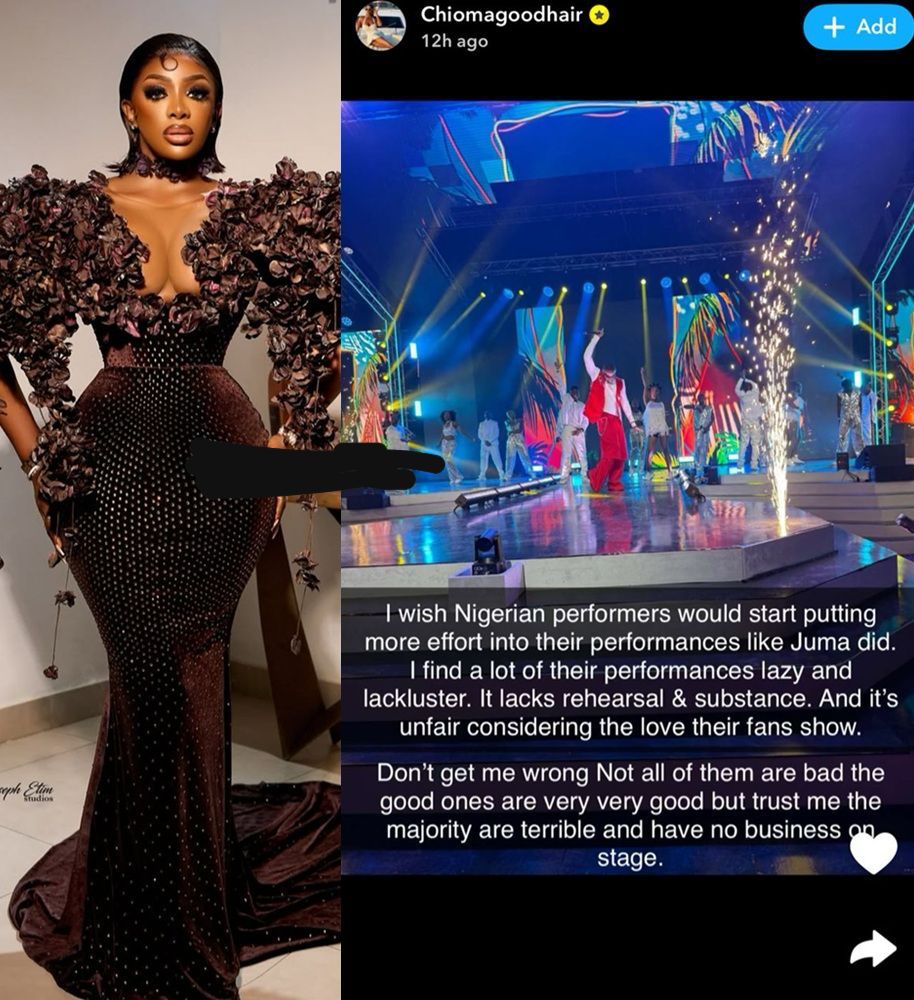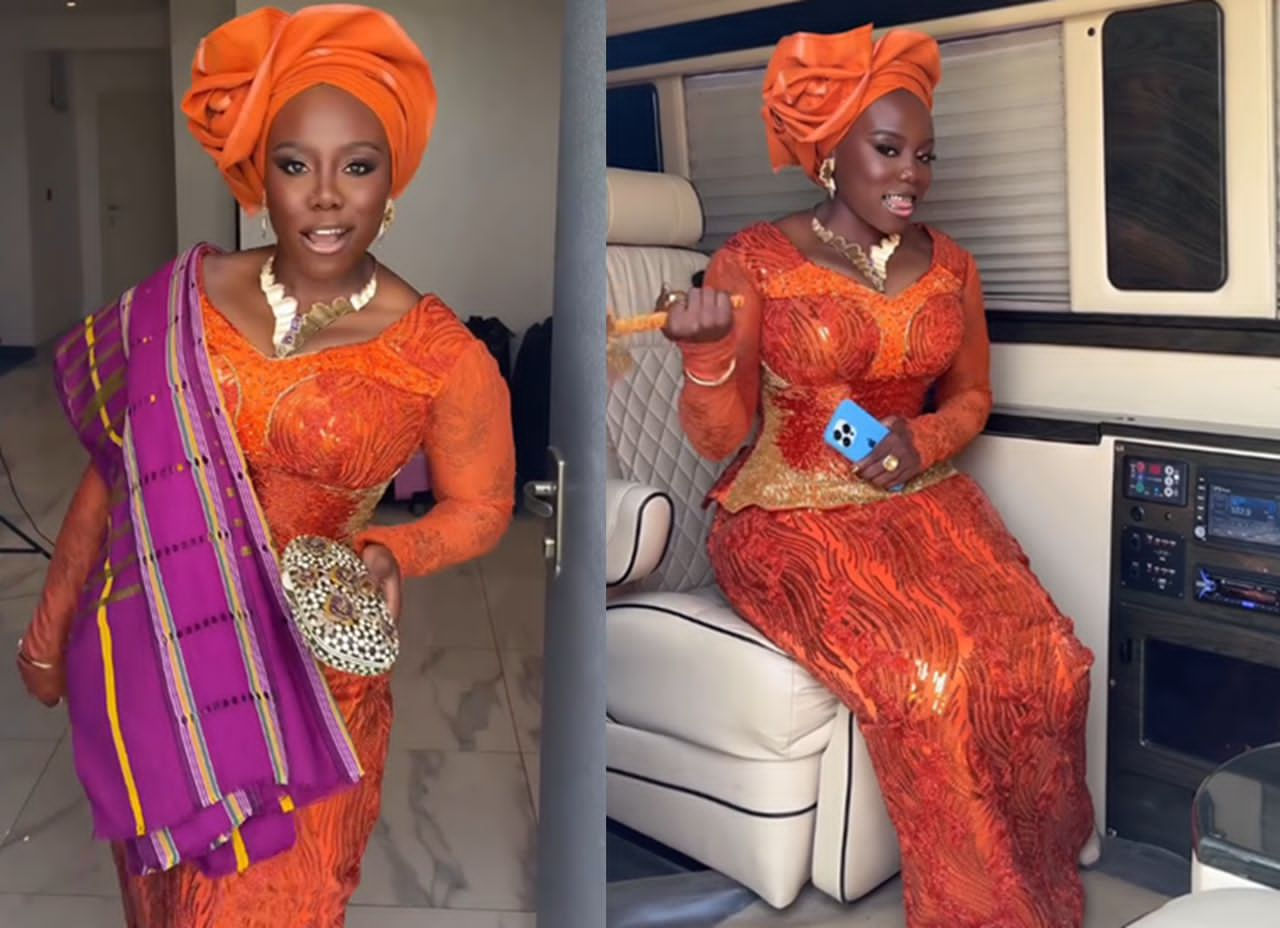
Chiomagoodhair Applauds Tanzanian Star Juma Jux, Calls Out Nigerian Performers for Lackluster Stage Energy

Nigerian fashion entrepreneur and social commentator Chioma Ikokwu, popularly known as Chiomagoodhair, has ignited a buzz on social media after praising Tanzanian singer Juma Jux’s performance at the Headies Awards while throwing subtle shade at Nigerian performers for what she described as a lack of effort in their stagecraft. The Headies, which took place with its usual fanfare and a lineup of top African talent, saw Juma Jux deliver what many fans described as a refreshing, visually captivating, and emotionally charged performance that raised the bar for live shows.
Chiomagoodhair, never one to shy away from expressing her thoughts, took to her Instagram stories shortly after the show aired and wrote, “I wish Nigerian performers would start putting more effort into their performances like Juma did.” Her statement, simple but potent, has since become a talking point across social media platforms, especially among music lovers, critics, and fans of the Nigerian entertainment industry.
For years, Nigerian music has dominated the African scene, both in sound and cultural influence. From Afrobeats to street-hop, Nigerian artists have charted globally and sold out arenas from Lagos to London. But despite the commercial success and popularity, one recurring criticism has echoed through the years—the quality of live performances, or more precisely, the lack of effort put into them. Many fans have long lamented the repetitive nature of performances, often reduced to artists lip-syncing or lazily walking across the stage with minimal choreography, little audience engagement, and no real storytelling.
Juma Jux’s performance at the Headies, in stark contrast, was a spectacle. He appeared intentional. From the stage design to costume, lighting, choreography, and his vocal delivery, there was a deliberate attempt to connect with the audience and give a performance worthy of a prestigious awards night. For Chiomagoodhair, who attended the event, it was more than enough reason to call for a standard reset. Her comment, while centered on praise, also served as a subtle critique—one that has stirred both agreement and resistance among Nigerian fans.
Some social media users were quick to agree with Chioma, pointing to the general lack of stage creativity in performances by some of Nigeria’s biggest stars. “She’s right, most of our faves come on stage with dark glasses and just vibe with a mic like they’re at a club,” one user tweeted. Another wrote, “Juma came to perform, not just stand and sing. That’s the difference.” Others drew comparisons with international acts like Beyoncé, Burna Boy, and Wizkid, noting that while some Nigerian artists are evolving and delivering more immersive performances, a large majority still seem to rely heavily on their hit songs rather than creating memorable live experiences.
However, not everyone received Chioma’s remarks with applause. Some fans viewed it as an unnecessary generalization and a case of undermining local talent. “One performance from a Tanzanian artist and suddenly Nigerian performers don’t put in effort?” a commenter posted defensively. “Do you know how much planning goes into these sets?” Another fan argued that the Nigerian music industry, while flourishing, is still catching up in terms of funding for elaborate stage shows and that comparing performances without context was unfair.
Still, Chioma’s message isn’t an isolated complaint. The topic has been long discussed in the Nigerian entertainment scene. In recent years, award shows and music festivals have faced backlash for underwhelming performances from big-name acts. Many fans feel that these performances fail to reflect the energy and passion that the artists bring to their studio recordings. They want more storytelling, more visual artistry, more rehearsed choreography, and above all, more professionalism.
Artists like Burna Boy have proven that Nigerian performers can raise the bar when given the right platform and resources. His global tours are renowned for their energy, full-band arrangements, and well-thought-out stage productions. Similarly, artists like Tiwa Savage and Rema have shown glimpses of creativity in their stage performances, experimenting with fashion, movement, and theatrics. But these seem to be exceptions rather than the norm.
Chiomagoodhair’s remarks are a call for consistency—a push for Nigerian acts to approach live performances as an art form in its own right, not just an obligation to show up and sing. Her statement might be viewed by some as harsh, but it reflects what many in the audience are silently thinking: that a performer’s job doesn’t end in the studio. In an era where fans are increasingly global, and attention spans are short, showmanship matters just as much as the song itself.
Moreover, the Headies Awards, having now positioned itself on a continental scale and relocated to international venues like Atlanta, have become a stage not just to celebrate Nigerian music but to showcase African excellence to a global audience. This makes the call for improved performance quality even more urgent. It is not just about Nigeria anymore—it’s about representing Africa in a way that’s compelling, competitive, and unforgettable.
While Chiomagoodhair might not be a music industry insider in the traditional sense, her opinion carries weight. As a prominent social figure with a keen eye for aesthetics and presentation, her take underscores what many fans want: performances that are rich, imaginative, and worthy of the artists’ musical legacy. Her praise for Juma Jux wasn't just about one artist doing well; it was a reflection of what could be achieved when artists take the stage seriously.
The conversation sparked by her post is an invitation to Nigerian performers to rethink their approach. It’s an opportunity for growth—not criticism for criticism's sake. Nigerian music has already conquered the charts; now it’s time to conquer the stage. With global eyes watching and African music finally getting its flowers, the quality of live performance must match the quality of the sound. That’s how icons are made. That’s how legacies are cemented.
If anything, Chiomagoodhair’s comment should be taken as a challenge—and the ball is now firmly in the court of Nigeria’s biggest music stars. Will they rise to it? Only time—and their next performance—will tell.


